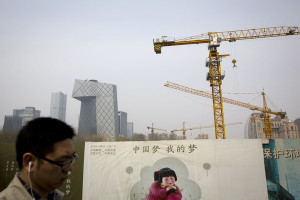May 28, 2015
Andy Wong/Associated Press
On a recent walk along a street in the southern Chinese city of Sanya, I heard a shop pumping out a rock version of the famous Communist Party anthem “Socialism Is Good.” Although I loathe this song, as the music became louder, I still found myself singing along under my breath. “The reactionaries toppled / Imperialists flee with their tails between their legs. … The Communist Party is good / The Communist Party is good / The Communist Party is a good leader of the people.”
For decades, Communist Party songs like this one have been ringing in Chinese people’s ears. For many people, myself included, these songs formed the soundtrack to our youth. Even today, though the party has become Communist in name only, they still flood the airwaves. It’s difficult to overestimate the extent of their influence not only on the Chinese spirit, but on the Chinese language itself.
More than 60 years of Communist hate education, inane propaganda and the comprehensive destruction of classical civilization have spawned a new style of speaking and writing. The Chinese language has become brutalized — and the Communist Party is largely to blame.
It’s not only government proclamations that clank with harsh cadences and revolutionary fervor, but also literary and scholarly works, and most disturbing, private speech.
The default lingo of high party officials, even on the most solemn occasions, includes banal aphorisms like, “to be turned into iron, the metal must be strong.” Official proclamations and the nightly newscasts speak of “social harmony” and the “Chinese spirit.” In addition to promoting the “China Dream” and a strong work ethic, President Xi Jinping is known for uttering lines like, “Never allow eating the Communist Party’s food and then smashing the Communist Party’s cooking pots.”
The government’s propaganda and education machinery moved past the revolutionary bloodthirsty bitterness. Our textbooks are litanies of brutal heroic deeds: “Stop a gun with your chest, hold a bomb in your hands, lie on a fire without moving, until you burn to death.” Nearly every Chinese child still wears a red scarf, “dyed with martyr’s blood,” and many grow up singing the young pioneers’ songs: “Always prepared, to perform noble feats, to wipe out our enemy.
Decades of this party blather have washed through a mighty propaganda machine straight into people’s minds and into the Chinese vernacular. In recent years, I have even heard many friends, some dissidents, using the language of our propagandists, and not ironically.
Two years ago, in a small town in central Shanxi Province, I overheard two old farmers debating whether a bowl of rice or a steamed bun was more satisfying. As the argument became more heated, one farmer accused the other, without irony, of being a “metaphysicist.”
Mao was skeptical of metaphysics and thus, over the years, it became a dubious concept, used in Chinese propaganda as a pejorative term. It’s fair to assume these two farmers didn’t know much about metaphysics, yet they were using the term as an insult, straight out of the party lexicon. Other phrases like “idealist” and “petit bourgeois sentimentalist” have become everyday terms of abuse, even when those who use them clearly have no real idea what they mean.
Revolutionary language is ubiquitous among normal Chinese people. We commonly refer to economic sectors like industry and agriculture as “battle fronts.” (Most workplaces, in fact, are called “fronts.”) Continuing to work while sick is likened to “the wounded not leaving the front line.” Many big enterprises talk about their marketing teams as “armies” or “troops,” and their sales territories as “battle zones.”
The literary scholar Perry Link and others have called this “Mao language.” In a 2012 essay on ChinaFile, the Asia Society’s website, Mr. Link wrote that such talk is “much more freighted with military metaphors and political biases than most.” In that same article, he gave some pointed examples of how Mao language has seeped into everyday usage: “At the ends of banquets, even today, mainland Chinese sometimes urge their friends to xiaomie [annihilate] the leftovers; a mother on a bus, the last time I was in Beijing, answered her little boy, who said, “Ma, I really need to pee!” by saying, “Jianchi! [Be resolute!] Uncle bus driver can’t stop here.”
The roots of this New Chinese Language naturally go back to Mao. In his 1942 Yan’an speech exhorting authors and artists to “serve the people,” Mao called for writers to use language people can understand. Even in essays he wrote before the Communist Party took power, Mao rebuked the use of “shady” words that “the masses” wouldn’t understand. In direct response to Mao’s dictates, the party apparatus promoted “the people’s language” — a plain and easy to understand style.

